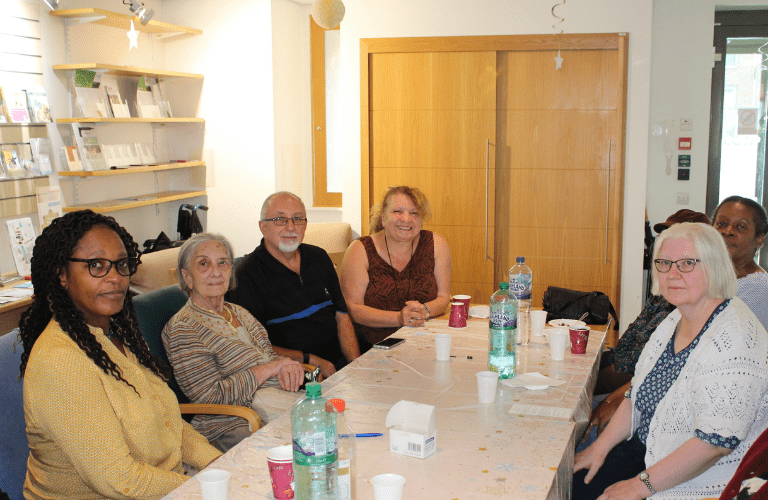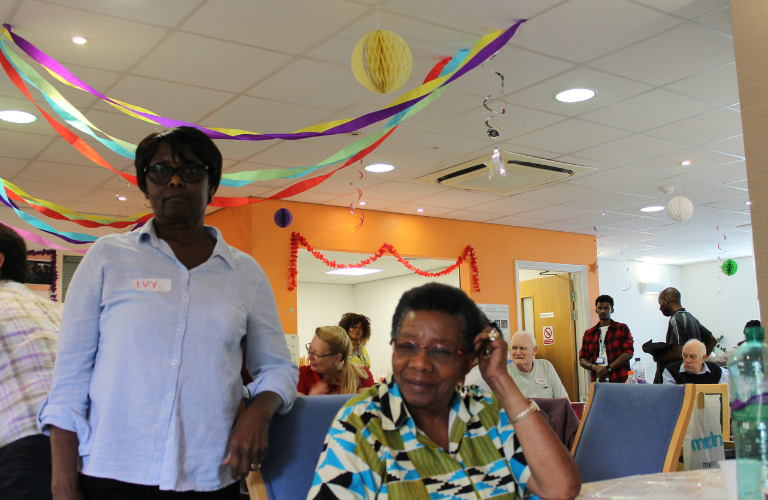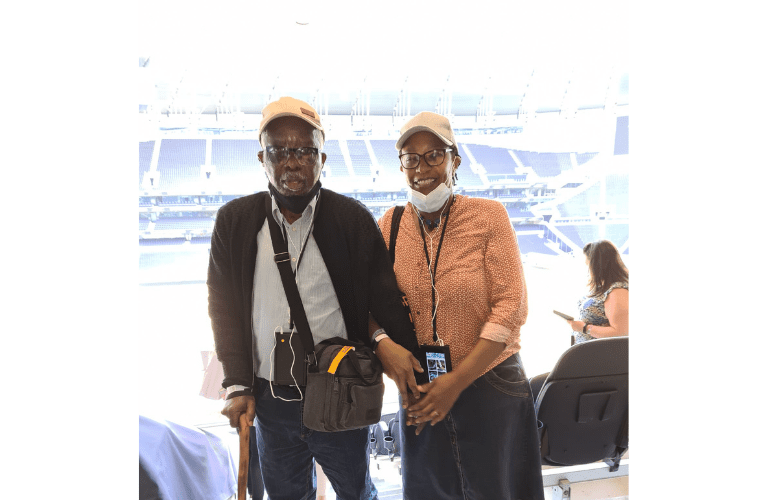Talking about Tom’s Club – an Admiral Nurse-led service
The Admiral Nurses involved in setting up Tom’s Club talk about how the service has coped, its history, and its future.

Supporting people and families with dementia since 2007, Tom’s Club in Haringey, London, has been used to adapting to challenging circumstances. The former Admiral Nurses, who set up the service with support from Barnet, Enfield and Haringey Mental Health NHS Trust and Age UK, couldn’t have predicted just how much the service would change during the demands of a pandemic, or that the service would still be running after a challenging year of lockdown.
The beginning of Tom’s Club
The support and stimulation group for carers and people with dementia was born after the experiences of Jean, the wife of ex-professional footballer, Tommy Harmer, who played for Tottenham Hotspur. Jean was unable to leave her husband, as he would become distressed, and so could not rely on the support of day care centres to give her respite as Tom could not settle. Jean provided funds to get the project off the ground and she was supported by the Haringey Admiral Nurse service.
“Services just weren’t set up for the carer and the person with dementia to spend time together,” recalls former Admiral Nurse Kate Green, who helped set up the service, with colleagues. “In fact, there are some people with dementia who would just not be able to manage if they didn’t have someone familiar with them all the time.”

Carers and people with dementia celebrating the 10th birthday for Tom’s Club in August 2019
The Haringey Admiral Nurses, at the time, already had access to family carers and people with dementia on their caseloads. The bigger issue for them was finding the venues, resources and staffing to put Tom’s Club on the map.
Tom’s Club started in a small room in St Ann’s Hospital in Haringey and then moved on to a day centre once a month – a welcome move as the centre contained two rooms, one for the carers and one for the people with dementia to engage in tailored activities based on Cognitive Stimulation Therapy (CST). CST is a prescribed treatment for people with dementia and is recommended by the National Institute for Health and Care Excellence (NICE).
Suitable for families
With the support of Age UK Haringey, Tom’s Club got the attention of Lewis Mary Haynes Trust who funded a project worker to create two further clubs in Haringey with the support of volunteers and local authority staff.
“Whatever we put on, we made sure that it would be suitable for the families attending; dancing sessions, quizzes, music and reminiscence were all on offer to help engage people with the condition.
“Carers also had the option to talk about their issues; this was particularly important for some of the male carers who could struggle to talk openly about what they were facing,” Kaye Efstathiou, another Haringey former Admiral Nurse says.
International attention
It wasn’t long until the mass mobilisation of volunteers, mental health professionals, and other members of the local community who were passionate about dementia, began to attract international attention.
“Tom’s Club was presented at the Alzheimer’s Conference in Warsaw in 2011 to tell people about its work. Continuing with the international theme, we even had some Japanese visitors attending the group,” Kate mentions. “Having Japanese visitors was particularly enlightening as we could highlight a different approach to dementia care and share the different experiences of the two countries. We were also nominated for the Innovation in Mental Health accolade at the Health Service Journal awards that same year.”

Sonia and Fred, who are supported by Tom’s Club, enjoy the Tottenham Hotspur grounds.
A platform for change
The pioneering approach of the service is evidenced again by the fact that it was set up prior to David Cameron’s 2020 Dementia Strategy, which raised awareness of the long-term condition more widely.
Alongside all the activities which Tom’s Club was hosting, the service also led to a carers group with more of a campaigning remit. This was in light of the number of day centres and other dementia support services at the time closing down; in 2013, legislation had been passed that was further putting strain on support services.
The fact that the location of our venues would just change around so much was indicative of just how underfunded dementia care was at the time mentions. “The service provided a platform to set up an independent campaigning group for, however. This was immensely empowering for so many as it showed what carers could do once they got together and shared experiences.
Providing tailored care
Barbara Fitzpatrick, who now works on Dementia UK’s Admiral Nurse Dementia Helpline, was another Admiral Nurse who supported carers and people with dementia from the start of Tom’s Club until she left the service in 2015. She remembers one activity she led in the session for people with dementia which showed the importance of providing tailored care. “I played one of my favourite Bob Marley tunes in a music session and one of the group members responded by spontaneously starting to dance and invited me to join him.
“His wife was watching all of this happen from the door. She was amazed and happy – she had never seen him so engaged since he was diagnosed. To see how much people with the condition can enjoy themselves in the moment is something that I’ll always treasure.”
Moving forward
With the arrival of the pandemic, there was a realisation that Tom’s Club couldn’t go on as it had before. Margaret Carroll, an Admiral Nurse who has been with Tom’s Club from 2016 to the present day, made the decision to deliver support virtually. “Weekly carers support sessions were established to allow us to check in on the carers and people with dementia, and for them to check on each other. We would also get a coach from the Tottenham Hotspur Foundation to deliver chair-based exercises.”
Now that the vaccination programme is well and truly underway and legal restrictions have ended, support services like Tom’s Club have been welcoming back some of the most vulnerable people in society.
At the end of June, 20 people with dementia and their carers were entertained in person by a musician at the staff canteen of St Ann’s Hospital as part of Tom’s Club. The next in-person visit is planned at the garden of The Haynes Dementia Hub, where Tom’s Club will be putting its new karaoke machine to the test.
For the Admiral Nurses who set up the service, it is a time to assess just what exactly is needed for social groups and other support networks for people with dementia after a uniquely challenging time. Kate Green says: “For me, Tom’s Club is the very definition of a joined-up approach, with professionals from health and social care, working with the voluntary sector to support people with dementia, and their families in their local community.
It’s been hugely valuable to reflect on the work we’ve all done to get Tom’s Club off the ground, and to know that it is still supporting families with dementia to this day. After how much the pandemic has changed things, particularly for families with dementia, now is the time to look at how support services can best serve some of the most vulnerable in society.”
